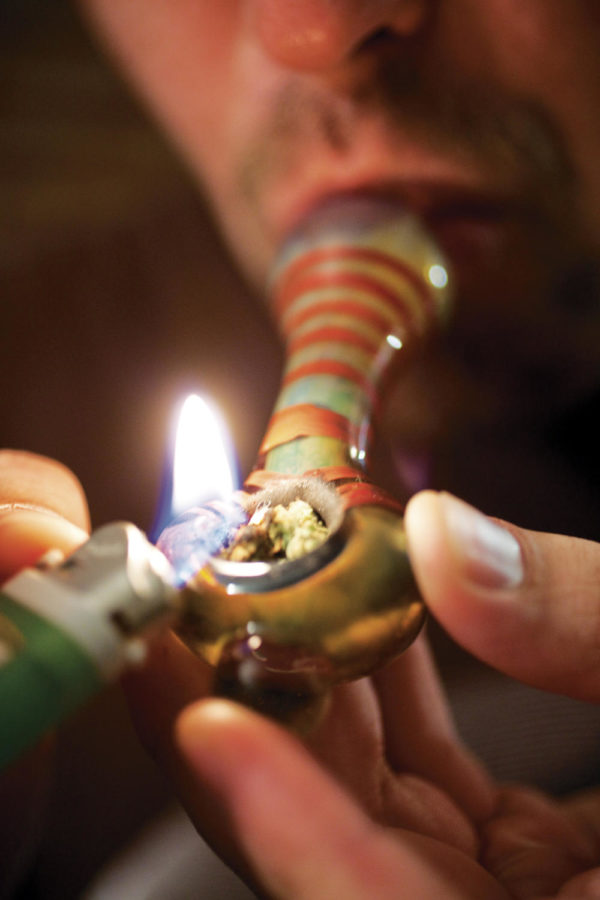Stoffa: Marijuana remains illegal despite recent voting
Columnist Titus believes Washington and Colorado are on the right track by legalizing distribution of recreational marijuana and Iowa is missing out on tax revenue.
November 13, 2012
Barack Obama was elected to a second term. Same-sex marriage was legalized in more states. But the vote that seems to maintain the highest amount of “hoorahs” and high fives was the legalization for recreational use of marijuana in Washington and Colorado.
Before any tokers out there pack your bags to move to the new havens of haze, keep in mind that marijuana legalization is not yet actually a reality.
But, this “trifling” detail is unlikely to prevent hundreds of thousands of those that enjoy that baked sensation from traveling to one of the American Amsterdams.
With the exodus of folks, and the likely immense bump in vacationing for a few days, there comes a great many challenges besides the already daunting decision of whether to smoke Canna Sutra, Nigerian, Purple Kush or any of the many other connoisseur marijuana strains.
Though increased tourism can be an excellent way to generate more funds for communities, weekend warriors from just across state lines, or anyone flying in to kiss the sky for a few days, can cause unanticipated troubles for maintaining the peace.
Denser traffic from deliveries or responsible stoners hailing cabs, to increased lines for purchases, to people with kine bud mindsets just chilling in the park or playing some tunes in public, crowding can become a safety issue.
Although there is little to no evidence to support the asinine claims concerning marijuana’s influence on individuals to make them violent or cause death, scores of stumbley folks searching for munchies or strolling along taking in the pleasant vibes of life in the city does not mean the criminals out there are giving a pass to those chiefin’ the reefer. There are oodles of individuals spoiling for fights or happy to rob tourists or others in a less than perfectly attentive state of mind of their possessions.
Operating vehicles, or merely meandering down the street under the influence presents a problem. Driving while high is like driving while drunk, you do not pass “GO” and collect $200. But that won’t stop people from trying anyway.
Marijuana traces can stay in your system weeks after smoking, even if you haven’t taken a bong rip for a few days. There is, as of now, no simple way for police to establish whether you are blazed, so when they suspect it, you likely head down to the station in cuffs.
Coming up next is drug testing for jobs. Public employees, and even a fair number of private, also have the wall of “random” urine tests to worry about. For residents of Colorado and Washington, despite the “legality” of your action, your job can still suspend or fire you for using an illegal substance.
The granddaddy of all woes for the 4/20 movement comes with the war on drugs. States can legalize weed all the live-long day, and it amounts to diddly-squat because Tetrahydrocannabinol remains a Schedule I hallucinogenic or psychedelic drug under the Controlled Substances Act, Title II of the Comprehensive Drug Abuse Prevention and Control Act of 1970. And since federal law trumps state law, all this kine bud hype could go up in smoke.
But on the optimistic side, state-support for marijuana could lead to change for the idiotic regulation and spending wasted on combating cannabis consumption and incarceration of pleasant people wanting only to smoke a joint after a hard day of work and eat a Twinkie or two.
The legalization for therapeutic use — easing attention-deficit issues, regulating sleep difficulties, assuaging anxiety, dealing with mild to moderate depression, muscle relaxation or even relieving the suffering to some extent of the terminally ill — has been embraced more and more at the state level, with the overall goal in mind of ending the more-harm-than-good prohibition of pot.
The potential for trafficking from Washington and Colorado into other states could result in some serious legal attention by those unscrupulous entrepreneurs wanting to turn a profit illegally. The federal government’s war on drugs might see this as reason to sue to repeal the state’s legalization.
Myriad political and legal aspects surrounding recreational legalization play out positively and negatively, sometimes both at once, to the future of marijuana in the United States. The Obama administration has shown little sign of support so far for decriminalization, however given the fund potential from legalization for assisting economic recovery — due to taxing and decreased spending for enforcement — these might be the pebbles that start an avalanche.
If you want change, go to Petitions.WhiteHouse.gov and sign the various movements each month to get marijuana decriminalization brought often to the eye of the White House. Contact your state representatives with your support for change, to push for legalization in your own state. Tell your friends and family about the changes coming. Who knows, maybe this country is finally moving beyond the antiquated notions somehow still steering it.







